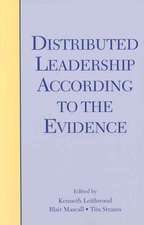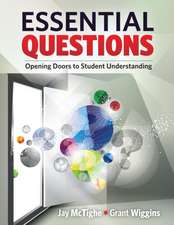Transforming Education: Meanings, myths and complexity
Autor Agnieszka Batesen Limba Engleză Hardback – 19 noi 2015
Complex responsive processes theory is utilised in an original way to critique leadership myths and explore the alternative, deeper meanings of educational transformation. The theory opens up new forms of understanding about how ordinary practitioners negotiate the meanings of ‘improvement’ in their everyday practice. It is in the gap between the emergence of these local interactions and the predetermined designs of policy-makers that educational transformation can be lost or found.
This book is an essential read for education professionals and students interested in the fields of complexity, education policy, leadership and management.
Preț: 729.58 lei
Preț vechi: 889.74 lei
-18% Nou
Puncte Express: 1094
Preț estimativ în valută:
139.60€ • 146.28$ • 115.41£
139.60€ • 146.28$ • 115.41£
Carte tipărită la comandă
Livrare economică 12-26 aprilie
Preluare comenzi: 021 569.72.76
Specificații
ISBN-13: 9781138920132
ISBN-10: 1138920134
Pagini: 228
Ilustrații: 4
Dimensiuni: 156 x 234 x 14 mm
Greutate: 0.5 kg
Ediția:1
Editura: Taylor & Francis
Colecția Routledge
Locul publicării:Oxford, United Kingdom
ISBN-10: 1138920134
Pagini: 228
Ilustrații: 4
Dimensiuni: 156 x 234 x 14 mm
Greutate: 0.5 kg
Ediția:1
Editura: Taylor & Francis
Colecția Routledge
Locul publicării:Oxford, United Kingdom
Public țintă
Postgraduate and ProfessionalCuprins
Contents
Part I The universe of complexity thinking
1 Educational transformation in the global age
2 (Un)certainty and the myth of control
3 Complex responsive processes theory
4 Researching complexity
Part II 'Global' policies and local interactions
5 The myth of 'spectacular' solutions: the Literacy and Numeracy Strategies
and their (un)desirable consequences
6 Everyday practice and the myth of perpetual crisis
7 Rethinking policy, strategy and educational leadership
Part III Complex responsive processes theory and educational ends
8 'Tremendous power', ethics and responsibility
9 Educational beginnings and ends
Appendix
Index
Part I The universe of complexity thinking
1 Educational transformation in the global age
2 (Un)certainty and the myth of control
3 Complex responsive processes theory
4 Researching complexity
Part II 'Global' policies and local interactions
5 The myth of 'spectacular' solutions: the Literacy and Numeracy Strategies
and their (un)desirable consequences
6 Everyday practice and the myth of perpetual crisis
7 Rethinking policy, strategy and educational leadership
Part III Complex responsive processes theory and educational ends
8 'Tremendous power', ethics and responsibility
9 Educational beginnings and ends
Appendix
Index
Notă biografică
Dr Agnieszka Bates lectures in Education at the School of Education and Lifelong Learning, University of East Anglia, UK.
Descriere
Transforming Education challenges the current global orthodoxy that ‘educational transformation’ can be achieved through a step-by-step implementation of centralised, performance-based strategies for school improvement.
Complex responsive processes theory is utilised in an original way to critique leadership myths and explore the alternative, deeper meanings of educational transformation. The theory opens up new forms of understanding about how ordinary practitioners negotiate the meanings of ‘improvement’ in their everyday practice. It is in the gap between the emergence of these local interactions and the predetermined designs of policy-makers that educational transformation can be lost or found.
This book is an essential read for education professionals and students interested in the fields of complexity, education policy, leadership and management.
Complex responsive processes theory is utilised in an original way to critique leadership myths and explore the alternative, deeper meanings of educational transformation. The theory opens up new forms of understanding about how ordinary practitioners negotiate the meanings of ‘improvement’ in their everyday practice. It is in the gap between the emergence of these local interactions and the predetermined designs of policy-makers that educational transformation can be lost or found.
This book is an essential read for education professionals and students interested in the fields of complexity, education policy, leadership and management.













